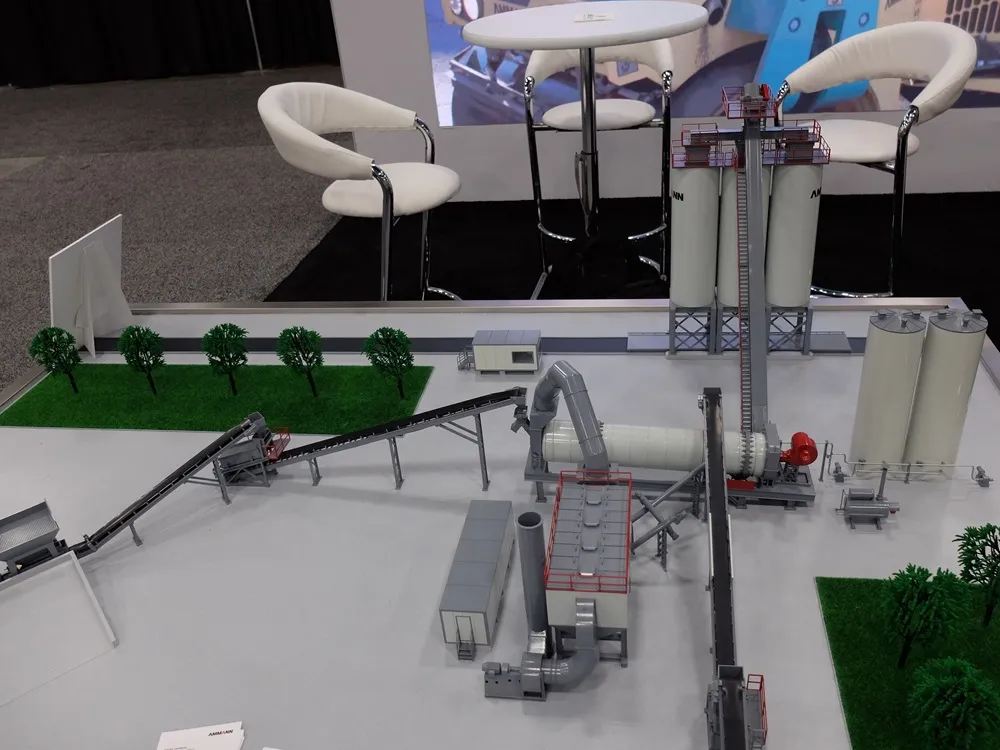A life-cycle assessment has found that an asphalt mix containing a high percentage of reclaimed asphalt pavement (RAP) along with an additive by Arizona Chemical can produce a significantly lower carbon footprint than virgin asphalt mix or a mix containing a low percentage of RAP.
The assessment study was carried out by third party Arthur D. Little, an international management consulting firm, using Arizona Chemical’s SYLVAROAD RP 1000 performance additive.
The work noted that cradle-to-gate, a road aspha
May 18, 2015
Read time: 3 mins
A life-cycle assessment has found that an asphalt mix containing a high percentage of reclaimed asphalt pavement (RAP) along with an additive by 7856 Arizona Chemical can produce a significantly lower carbon footprint than virgin asphalt mix or a mix containing a low percentage of RAP.
The assessment study was carried out by third party Arthur D. Little, an international management consulting firm, using Arizona Chemical’s SYLVAROAD RP 1000 performance additive.
The work noted that cradle-to-gate, a road asphalt mix of 30% virgin materials and 70% RAP containing SYLVAROAD RP 1000 results in a 27% reduction in CO2/tonne when compared to asphalt made with 100% virgin material.
Arizona Chemical said the findings are important given that there are 4.26 million kilometres of paved roads in the United States and 5 million kilometres in Europe.
“Road pavement construction requires use of high performance material as the highest priority,” said Raquel Silverberg, business unit director for roads and construction at Arizona Chemical. “This previously limited the amount of reclaimed asphalt pavement – or RAP – that could be used to about 20-30% because asphalt pavement manufacturers and engineers found that higher levels of RAP did not meet their requirements.
“Customers today are continuing to demand superior performance, while adding reduced environmental impact, lower total cost of ownership and a preference to use more RAP to their list of requirements, there is finally a solution that accomplishes all those objectives,” said Silverberg.
Laboratory and field tests have shown that a mix containing 70% RAP with SYLVAROAD RP 1000 does meet rigid performance specifications set by road owners, such as rutting, cracking and water resistance.
Other environmental advantages of SYLVAROA RP 1000, according to the Arthur D. Little study, include a mix containing 30 percent RAP has a carbon footprint 17% higher than a 70% RAP mixture using Arizona’s performance additive.
Also, emissions of volatile chemicals - mainly CO, NOx and CxHy - are cut in half with 70% RAP mix compared to a 30% RAP mix or 100% virgin asphalt.
Overall, raw materials are the main contributors to greenhouse gas emissions (GHG) in asphalt mixing processes, with aggregates and bitumen the largest contributors. A mix containing 70% RAP and SYLVAROA RP 1000 emits nearly 43% less GHG than virgin asphalt.
Arizona Chemical has more than 1,100 employees and refineries and manufacturing plants in six countries on both sides of the Atlantic. The company has headquarters in the United States in Jacksonville, Florida, as well as in Almere in the Netherlands.
The assessment study was carried out by third party Arthur D. Little, an international management consulting firm, using Arizona Chemical’s SYLVAROAD RP 1000 performance additive.
The work noted that cradle-to-gate, a road asphalt mix of 30% virgin materials and 70% RAP containing SYLVAROAD RP 1000 results in a 27% reduction in CO2/tonne when compared to asphalt made with 100% virgin material.
Arizona Chemical said the findings are important given that there are 4.26 million kilometres of paved roads in the United States and 5 million kilometres in Europe.
“Road pavement construction requires use of high performance material as the highest priority,” said Raquel Silverberg, business unit director for roads and construction at Arizona Chemical. “This previously limited the amount of reclaimed asphalt pavement – or RAP – that could be used to about 20-30% because asphalt pavement manufacturers and engineers found that higher levels of RAP did not meet their requirements.
“Customers today are continuing to demand superior performance, while adding reduced environmental impact, lower total cost of ownership and a preference to use more RAP to their list of requirements, there is finally a solution that accomplishes all those objectives,” said Silverberg.
Laboratory and field tests have shown that a mix containing 70% RAP with SYLVAROAD RP 1000 does meet rigid performance specifications set by road owners, such as rutting, cracking and water resistance.
Other environmental advantages of SYLVAROA RP 1000, according to the Arthur D. Little study, include a mix containing 30 percent RAP has a carbon footprint 17% higher than a 70% RAP mixture using Arizona’s performance additive.
Also, emissions of volatile chemicals - mainly CO, NOx and CxHy - are cut in half with 70% RAP mix compared to a 30% RAP mix or 100% virgin asphalt.
Overall, raw materials are the main contributors to greenhouse gas emissions (GHG) in asphalt mixing processes, with aggregates and bitumen the largest contributors. A mix containing 70% RAP and SYLVAROA RP 1000 emits nearly 43% less GHG than virgin asphalt.
Arizona Chemical has more than 1,100 employees and refineries and manufacturing plants in six countries on both sides of the Atlantic. The company has headquarters in the United States in Jacksonville, Florida, as well as in Almere in the Netherlands.






